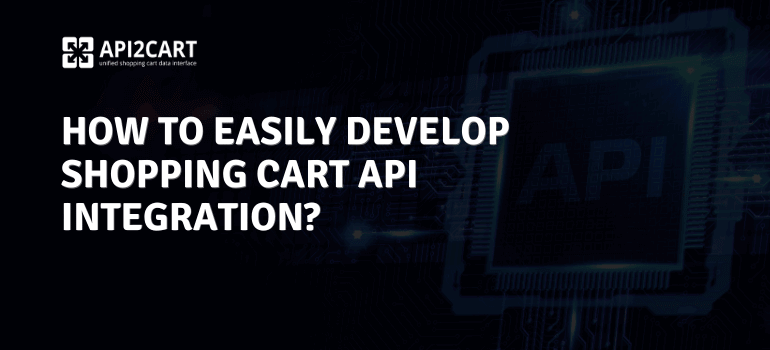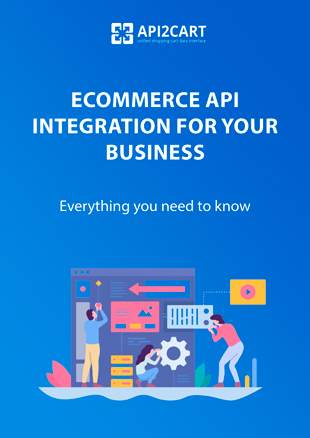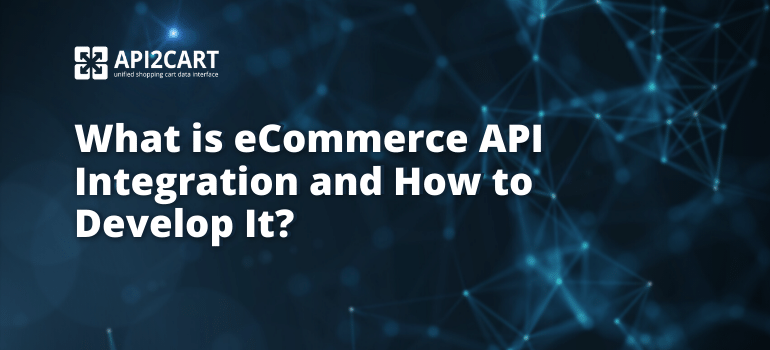
B2B SaaS is a competitive industry, no matter what product you provide. Whether it is eCommerce or any other sphere that you work with, many competitors are creating solutions similar to yours.
When it comes to B2B SaaS for eCommerce, the competition is endless. eCommerce software vendors are developing countless applications for e-store owners to streamline their eCommerce operations. If you wish to stand out in such a scenario, shopping cart API integration is the key.
The more shopping platforms you integrate with, the higher the chances are to cover the needs of most online merchants.
In this article, you will discover more about shopping cart API integration and how to easily integrate with eCommerce APIs.
What is the Shopping Cart API?
Shopping cart API (application programming interface) is a kind of access to various types of store information. It includes orders, products, customers, shipments, categories, etc. For every B2B SaaS provider, shopping cart API offers a pool of opportunities.
For example, as an inventory management software vendor, you need to access information related to inventory and synchronize it across all your sales channels from the shopping carts.
When you connect with these platforms, you will be able to retrieve all the required information from e-stores. In this process, the shopping cart API becomes the medium through which the two applications - eCommerce software and shopping cart interact to transfer data.
What is Shopping Cart Integration?
Shopping cart API integration is the process of establishing an API connection between eCommerce software like inventory management systems, multichannel systems, order management systems, warehouse management systems, and others, with shopping carts such as Shopify, Magento, WooCommerce, BigCommerce, WP e-Commerce, etc.
During the process, the API of eCommerce software integrates with the API of a shopping cart.

Top 5 Shopping Cart APIs
Some of the most popular APIs of eCommerce platforms and marketplaces available in the market are described below:
1. Magento API
One of the most sought-after platforms for integration is Magento.
Magento API supports both JSON and XML formats along with four methods to access and manage e-store data - POST, PUT, GET, DELETE. Moreover, it uses the XML-RPC clients for communication and has both SOAP and REST APIs.
More than 740 000 websites are built on Magento, from which over 196,000 merchants are actively leveraging the platform.
2. Amazon API
Amazon API allows to access the data from stores placed on Amazon. The marketplace is currently operating with 310 million monthly users, and 90 million paid users (Amazon Prime subscribers).
When it comes to providing API functions, it also allows the eCommerce software to exchange data connected with product listings, orders, payments, reports, categories, and more with the e-stores. Along with such data, you can also retrieve information like seller profiles, product reviews, customer feedback, seller feedback from the platform. For communication, it limits its support to CSV files or XML, demanding specific skills for interaction or information retrieval.
3. eBay API
Another platform recommended for integration is eBay. The active user count on eBay has already reached approximately 177 million with product listings captured as 1 million. It has its popularity across 30 countries of the globe.
eBay API directly communicates with the eBay database over the internet with the help of XML. It allows the software vendors to display product listings on eBay, view information of all the products, customers, and orders, get categories from eBay, retrieve a list of items from the client stores, and do many more similar tasks.
4. WooCommerce API
WooCommerce API has also become the most significant name in the list of popular APIs for shopping cart API integration. With more than 2.4 billion user websites, WooCommerce boasts its existence as one of the largest and most stable shopping carts out there.
With WooCommerce API, the software vendors can work with translated WooCommerce content related to products, orders, categories, and more. They can create, read, delete, or update such content with the help of this API. Moreover, it features REST API and enables adding and removing stocks, filtering orders, and many more such activities.
5. Shopify API
With 1 million active users across the globe, Shopify is again the most popular shopping cart that enables shopping cart API integration for the eCommerce software vendors. Currently, 3,685,763 websites are leveraging the benefits offered by the platform.
For eCommerce software vendors, Shopify API allows creation of such tools that can directly interact with Shopify and are available for free on the App Store. With Shopify API, you can work with products, categories, customers, orders, etc, using the customized methods created for these options. It offers support for both JSON and XML.
What are the Main Difficulties with Integration?
eCommerce integration can be challenging to maintain without the help of third-party solutions. When developing a shopping cart integration on your own, consider the following issues:
- developing integration with each eCommerce platform costswill cost thousands of dollars;
- it will take about a month to finish establishing one integration. Usually, it is recommended to have multiple integrations. However, waiting for each integration for your app to be developed and tested correctly may cost you potential clients;
- one of the challenging aspects of integration is when the shopping platforms release new versions. You may experience inaccurate information or data retrieved. You will also have to spend time changing the code you have written;
- there are a lot of issues with APIs of some of the eCommerce platforms and marketplaces. For example, Amazon API is very old, and its API documentation is complicated and sometimes doesn’t provide all the necessary information. Magento API integration isn’t so easy because of the inaccuracy of its documentation. Etsy API documentation is also difficult to find, and the lack of it can cause extra development time and investigations;
- shopping cart integration requires highly skilled developers with expirience in developing such integrations. Usually, they are hard to find, as a robust integration goes with significant technological complexities;
- when you manualy develop the integrations, it can cause serious security threats to your software. If the integrations are weak, your system may be susceptible to attackers who may try to steal data.
Unified Solution for Shopping Cart API Integration
Now that you know the importance and the underlying process of shopping cart API integration, it’s time to offer you the best deal for your B2B SaaS business.
Considering the challenges associated with every integration and the number of integrations you would require to cover all your clients’ eCommerce platforms, you need a unified solution to establish integration between your eCommerce software and all the shopping carts.
Such a solution that connects an eCommerce software with all the shopping carts and marketplaces at once is API2Cart. It is a unified shopping cart integration API that allows your software to integrate with more than 40 eCommerce platforms in one go.
With API2Cart, you can add, delete, update, and modify data into all the client stores without any hassles. We provide more than 100 API methods to work with the store info like orders, products, customers, shipments, categories, etc.
API2Cart allows your software to reduce TCO, minimize time, financial investment, and reduce time spent on integration maintenance. Best of all, you can try our service for free over 30 days and see exactly how it works.
Contact us to discover how API2Cart can help you establish a robust shopping cart API integration strategy.



